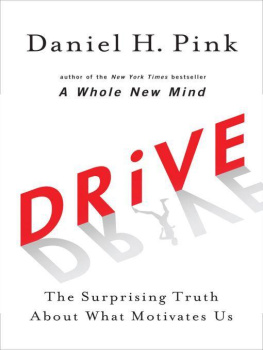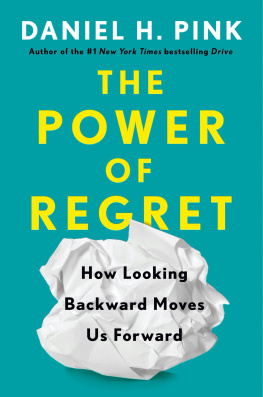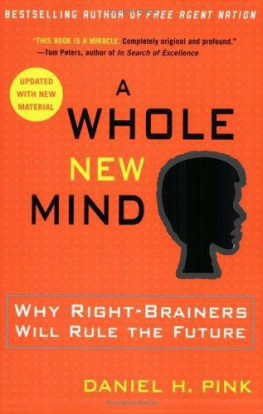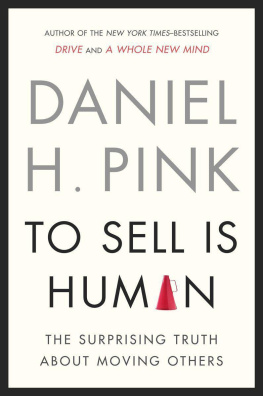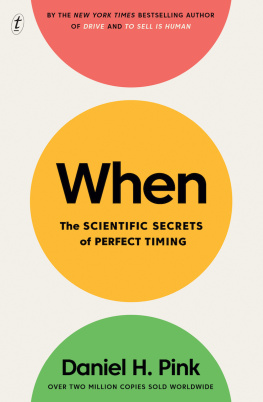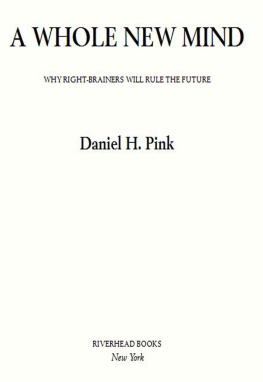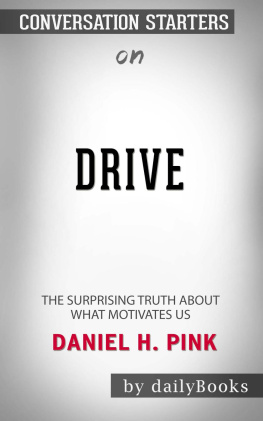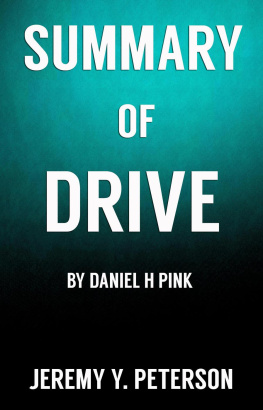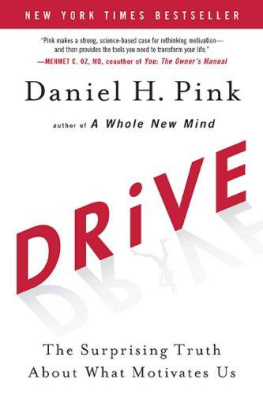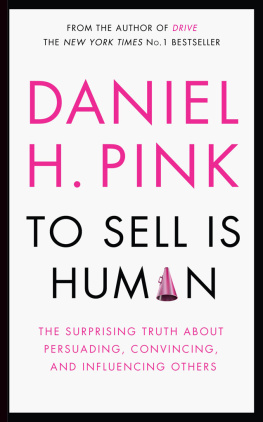ACKNOWLEDGMENTS
And now a tip of the hat to those who kept me motivated.
At Riverhead Books, Jake Morrisseys skills as an editor were matched only by his talents as a therapist. He made this a better book without making its author a crazier person. Thanks also to Geoff Kloske, who threw his support behind this project early and enthusiasticallyand to Riverheads extraordinary production team for their skill and patience.
Rafe Sagalyn understood the promise of this book even before I did and championed it with his usual deft touch. Im grateful to have him as a literary agent and a friend. A huge shout-out as well to the talented Bridget Wagner, who has spread the word about Drive to publishers around the world.
Vanessa Carr did a terrific job of finding obscure social psychology studies in the crevices of the Internet and on the dusty shelves of university libraries. Rob Ten Pas once again used his considerable talents to craft pictures to enliven my less considerable words. Sarah Rainone provided spectacular help pushing the project over the finish line during a hot and dreary summer. Remember all three of those names, folks. Theyre stars.
One of the joys of working on this book was having a few long conversations and interviews with Mike Csikszentmihalyi, Ed Deci, and Rich Ryan, who have long been heroes of mine. If there were any justice in the world, all three would win a Nobel Prizeand if that justice had a slight sense of humor, the prize would be in economics. Any errors or misinterpretations of their work are my fault, not theirs.
Its about at this point that authors who are parents apologize to their children for missed dinners. Not me. I dont miss meals. But I did skip nearly everything else for several months and that forced the amazing Pink kidsSophia, Eliza, and Saul, to whom Drive is dedicatedinto a dad-less existence for a while. Sorry, guys. Fortunately, as youve no doubt already discovered, I need you a lot more than you need me.
Then theres the threesomes mom, Jessica Anne Lerner. As always, Jessica was the first, last, and most honest sounding board for every idea I spit out. And as always, Jessica read every word I wroteincluding many thousands of them aloud while I sat in a red chair cringing at their sound. For these small reasons, and many larger ones that are none of your business, this gorgeous, graceful woman leaves me slack-jawedin awe and in love.
FIND OUT MOREABOUT YOURSELF AND THIS TOPIC
Are you Type I or Type X?
Take the comprehensive, free online assessment at www.danpink.com/drive.html
Interested in regular updates on the science
and practice of human motivation?
Subscribe toDrive Times, a free quarterly e-mail
newsletter at
www.danpink.com/drive.html
CHAPTER 1
The Rise and Fall of Motivation 2.0
Imagine its 1995. You sit down with an economistan accomplished business school professor with a Ph.D. in economics. You say to her: Ive got a crystal ball here that can peer fifteen years into the future. Id like to test your forecasting powers.
Shes skeptical, but she decides to humor you.
Im going to describe two new encyclopediasone just out, the other to be launched in a few years. You have to predict which will be more successful in 2010.
Bring it, she says.
The first encyclopedia comes from Microsoft. As you know, Microsoft is already a large and profitable company. And with this years introduction of Windows 95, its about to become an era-defining colossus. Microsoft will fund this encyclopedia. It will pay professional writers and editors to craft articles on thousands of topics. Well-compensated managers will oversee the project to ensure its completed on budget and on time. Then Microsoft will sell the encyclopedia on CD-ROMs and later online.
The second encyclopedia wont come from a company. It will be created by tens of thousands of people who write and edit articles for fun. These hobbyists wont need any special qualifications to participate. And nobody will be paid a dollar or a euro or a yen to write or edit articles. Participants will have to contribute their laborsometimes twenty and thirty hours per weekfor free. The encyclopedia itself, which will exist online, will also be freeno charge for anyone who wants to use it.
Now, you say to the economist, think forward fifteen years. According to my crystal ball, in 2010, one of these encyclopedias will be the largest and most popular in the world and the other will be defunct. Which is which?
In 1995, I doubt you could have a found a single sober economist anywhere on planet Earth who would not have picked that first model as the success. Any other conclusion would have been laughablecontrary to nearly every business principle she taught her students. It would have been like asking a zoologist who would win a 200-meter footrace between a cheetah and your brother-in-law. Not even close.
Sure, that ragtag band of volunteers might produce something. But there was no way its product could compete with an offering from a powerful profit-driven company. The incentives were all wrong. Microsoft stood to gain from the success of its product; everyone involved in the other project knew from the outset that success would earn them nothing. Most important, Microsofts writers, editors, and managers were paid. The other projects contributors were not. In fact, it probably cost them money each time they performed free work instead of remunerative labor. The question was such a no-brainer that our economist wouldnt even have considered putting it on an exam for her MBA class. It was too easy.
But you know how things turned out.
On October 31, 2009, Microsoft pulled the plug on MSN Encarta, its disc and online encyclopedia, which had been on the market for sixteen years. Meanwhile, Wikipediathat second modelended up becoming the largest and most popular encyclopedia in the world. Just eight years after its inception, Wikipedia had more than 13 million articles in some 260 languages, including 3 million in English alone.
What happened? The conventional view of human motivation has a very hard time explaining this result.
THE TRIUMPH OF CARROTS AND STICKS
Computerswhether the giant mainframes in Decis experiments, the iMac on which Im writing this sentence, or the mobile phone chirping in your pocketall have operating systems. Beneath the surface of the hardware you touch and the programs you manipulate is a complex layer of software that contains the instructions, protocols, and suppositions that enable everything to function smoothly. Most of us dont think much about operating systems. We notice them only when they start failingwhen the hardware and software theyre supposed to manage grow too large and complicated for the current operating system to handle. Then our computer starts crashing. We complain. And smart software developers, whove always been tinkering with pieces of the program, sit down to write a fundamentally better onean upgrade.
Societies also have operating systems. The laws, social customs, and economic arrangements that we encounter each day sit atop a layer of instructions, protocols, and suppositions about how the world works. And much of our societal operating system consists of a set of assumptions about human behavior.
In our very early daysI mean very early days, say, fifty thousand years agothe underlying assumption about human behavior was simple and true. We were trying to survive. From roaming the savannah to gather food to scrambling for the bushes when a saber-toothed tiger approached, that drive guided most of our behavior. Call this early operating system Motivation 1.0. It wasnt especially elegant, nor was it much different from those of rhesus monkeys, giant apes, or many other animals. But it served us nicely. It worked well. Until it didnt.

